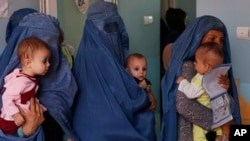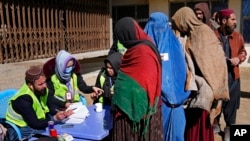The U.N. children’s agency representative in Afghanistan says his agency, including its female Afghan staff, continue to work in the country despite a Taliban decree banning local women from working for the organization.
“I would say that all women of the U.N. in Afghanistan are working,” UNICEF’s Fran Equiza told reporters during a news conference at U.N. headquarters in New York. “They are working some from home, some of them from offices, some of them from the field.”
He said this applies to UNICEF and other U.N. agencies in Afghanistan.
“The Afghan women are not going to give up, no matter what,” he said, speaking of their resilience and commitment to their country.
When the ban was announced in early April, the U.N. said Secretary-General Antonio Guterres found it “unacceptable” and “inconceivable” and feared it would further undermine the organization’s humanitarian work in the country. He convened a meeting of countries with special envoys for Afghanistan earlier this month in Doha, Qatar, to discuss what could be done about the intensifying Taliban crackdown on women.
Following the April edict, U.N. staff were instructed to work from home where possible until the organization could get clarity from Taliban authorities.
Equiza would not comment on whether female staff members have been physically or verbally harassed by the Taliban for defying their edict, stressing that the organization takes seriously its duty of care for its staff.
“We are still subject to threats and to a number of risks,” he told reporters. “We don’t take any decision that’s an unacceptable risk for anyone.”
The ban on Afghan women working with the U.N. followed a series of restrictions on women's and girls’ rights, including prohibiting women from working with domestic and international aid groups and banning girls from attending secondary schools and universities.
The Taliban said last month that their decision to bar local women from working for the United Nations was an "internal social matter of Afghanistan" that all countries should respect. So far they have ignored an April 27 U.N. Security Council resolution demanding they swiftly reverse their restrictions.
Humanitarian emergency
More than 28 million people, including more than 15 million children, need humanitarian and protection assistance in Afghanistan. In Afghanistan’s conservative society, female aid workers are critical to reaching a large portion of the population.
Children are particularly hard hit by rampant poverty, which is estimated to affect nearly 90% of the population.
"They wake up hungry. They go to bed hungry. They don’t have clean water to quench their thirst, or soft blankets in which to sleep,” Equiza said. “They have become all too used to laboring at home, on the streets, in fields, in mines and in shops. Too many live in fear of violence or early marriage. Too many are burdened by the weight of adult responsibility. Too many have been robbed of an education — their one hope of a better life.”
UNICEF says 2.3 million Afghan children are expected to face acute malnutrition in 2023. Of that number, 875,000 of them need treatment for severe acute malnutrition, which can be deadly.
UNICEF has appealed for $1.65 billion this year to reach 19 million Afghans, including 10.3 million children. The appeal is less than a quarter funded, with the year nearly half over.





